Ashka Jhaveri, Andie Parry, Annika Ganzeveld, Amin Soltani, and Nicholas Carl
The Iran Update provides insights into Iranian and Iranian-sponsored activities abroad that undermine regional stability and threaten US forces and interests. It also covers events and trends that affect the stability and decision-making of the Iranian regime. The Critical Threats Project (CTP) at the American Enterprise Institute and the Institute for the Study of War (ISW) provides these updates regularly based on regional events. For more on developments in Iran and the region, see our interactive map of Iran and the Middle East.
CTP and ISW have refocused the update to cover the Israel-Hamas war. The new sections address developments in the Gaza Strip, the West Bank, Lebanon, and Syria, as well as noteworthy activity from Iran’s Axis of Resistance. We do not report in detail on war crimes because these activities are well-covered in Western media and do not directly affect the military operations we are assessing and forecasting. We utterly condemn violations of the laws of armed conflict and the Geneva Conventions and crimes against humanity even though we do not describe them in these reports.
Key Takeaways:
- Palestinian militias continued attacks at their usual rate from the Gaza Strip into Israel. The al Qassem Brigades claimed to fire rockets at Dimona for the first time since the war started.
- Israeli ground forces advanced into the Gaza Strip. The al Qassem Brigades claimed to attack advancing IDF forces in Beit Hanoun and east of Bureij. Palestinian militias, including Hamas, are framing the IDF advances into the Gaza Strip as a failure likely to encourage civilians to stay rather than try to evacuate toward the southern part of the strip.
- The Lions’ Den—a West Bank-based Palestinian militia—appeared to implicitly call for further mobilization and violence against Israel in the West Bank after the IDF conducted ground operations into the Gaza Strip. Iranian and Palestinian sources are describing Israeli settlers in the West Bank as legitimate military targets. Palestinian militants clashed with Israeli forces and held large, anti-Israel demonstrations at their usual rate across the West Bank.
- Iranian-backed militants, including Lebanese Hezbollah, conducted 12 attacks into Israel as part of an ongoing attack campaign targeting IDF radar and sensor sites and military targets.
- The Islamic Resistance in Iraq—a coalition of Iranian-backed Iraqi militias—claimed to attack US forces at al Tanf Garrison in eastern Syria.
- Iran is conducting a messaging campaign (1) to signal to the United States the potential for further Iranian-backed attacks against US forces in the region and (2) to reassure members of its Axis of Resistance, especially LH, of Iran’s commitment to supporting them in the event that the United States enters the war in support of Israel.
- IRGC-affiliated media is continuing to provide the informational cover for Iran and the Axis of Resistance to conduct attacks against US positions on the false grounds that the United States is directing Israeli operations into the Gaza Strip.
Gaza Strip
Axis of Resistance campaign objectives:Erode the will of Israeli political establishment and public to launch and sustain a major ground operation into the Gaza Strip
Degrade IDF material and morale around the Gaza Strip
Palestinian militias continued attacks at their usual rate from the Gaza Strip into Israel on October 28. The al Qassem Brigades—Hamas’ militant wing—claimed responsibility for nine indirect fire attacks. The al Qassem Brigades claimed to fire rockets at Dimona for the first time since the war started.[1] Israeli news reported that the Iron Dome air defense system intercepted three of the rockets and one fell in an open area.[2] The Israeli Peres Negev Nuclear Research Center is based outside of Dimona in southern Israel.[3] Iran and its Axis of Resistance have threatened to attack the facility previously, which has prompted Israel to reinforce the reactor, according to the head of the Israeli Atomic Energy Commission head.[4] Saraya al Quds—the militant wing of Palestinian Islamic Jihad (PIJ)—separately claimed responsibility for nine mortar and rocket attacks.[5]
Recorded reports of rocket attacks; CTP-ISW cannot independently verify impact.
Recorded reports of rocket attacks; CTP-ISW cannot independently verify impact.
Israeli Ground Operations in the Gaza Strip
Israeli ground forces advanced into the Gaza Strip on October 27. IDF Chief of Staff Lieutenant General Herzi Halevi said IDF ground forces supported by heavy fire entered the Gaza Strip to dismantle Hamas, secure the border, and return hostages.[6] IDF Southern Command Fire Center Commander Lieutenant Colonel Gilad Keinan stated that Israel is using fire “from the air, from the ground, or from the underground.”[7] IDF spokesperson Rear Admiral Daniel Hagari said that Israeli troops entered the northern Gaza Strip with ground troops, armor, and artillery.[8] The IDF released footage of tanks entering along the beach in the northwestern Gaza Strip.[9] Hagari added that the ground operation was supported by "very significant, massive attacks from the sea."[10] The IDF Air Force struck 150 underground targets in the northern Gaza Strip overnight, which included striking Hamas militants, tunnels, and other subterranean infrastructure.[11] Hamas maintains around 480 kilometers of tunnels under the strip.[12]
The al Qassem Brigades claimed to attack advancing IDF forces in Beit Hanoun and east of Bureij overnight.[13] Hamas official Ali Bakara said Palestinian militants used anti-tank missiles to repel the attack and that it has been preparing defensive plans since the beginning of the battle.[14] Israeli Defense Minister Yoav Gallant said overnight that Israel completed a phase in the war and that Israel will continue to be strong and precise.[15] CTP-ISW cannot independently verify the locations of these Israeli ground operations.
Palestinian militias, including Hamas, are framing the IDF advances into the Gaza Strip as a failure likely to encourage civilians to stay rather than try to evacuate toward the southern part of the strip.Hamas claimed that the Israeli ground attack into the Gaza Strip was a failure.[16] A Saraya al Quds official said that the IDF received painful strikes on the points of advance.[17] Popular Front for the Liberation of Palestine militant wing spokesman Abu Jamal said the IDF suffered heavy losses.[18] An Israeli spokesperson said Israel had no casualties in Friday night's fighting.[19]
Israel issued an urgent message for residents of the Gaza Strip and Gaza City to temporarily relocate south until intense hostilities end.[20] Israel dropped flyers in the northern part of the strip with a similar message. Hamas previously urged locals to stay in Gaza, describing the Israeli warnings on October 12 as “psychological warfare” against Palestinians.
US Secretary of State Antony Blinken said that Hamas continues to use civilians as human shields, which intentionally puts these civilians in harm's way, to protect Hamas’ military infrastructure and weapons.[21] Civilians leaving the northern Gaza Strip en masse would risk depriving Hamas of the ability to use regular civilian activity to mask its military activities.
Iranian officials and media continued to argue on October 28 that Israeli ground operations into the Gaza Strip are failing and will not achieve their aim of destroying Hamas. IRGC-affiliated Fars News Agency claimed that on October 27 that the IDF ground operations inside the Gaza Strip were unsuccessful.[22] IRGC-affiliated Tasnim News Agency similarly argued that Israel has had to repeatedly retreat after conducting limited operations inside the Gaza Strip and that Israel has not been able to do much more than launch a media campaign justifying these retreats.[23] State-controlled Islamic Republic News Agency recirculated Hamas’ statement that the IDF operations failed as Hamas inflicted significant casualties and damage on the IDF.[24] IRGC Commander Major General Hossein Salami argued that Israel is incapable of defeating Hamas, claiming that the Gaza Strip will become the grave for many Israeli soldiers.[25]
This Iranian messaging ignores the fact that much of the IDF activity into the Gaza Strip in recent days had been raids.[26] US military doctrine defines a raid as “an operation to temporarily seize an area in order to secure information, confuse an enemy, capture personnel or equipment, or to destroy a capability culminating with a planned withdrawal.”[27] The IDF withdrawals after their operations were consistent with the US military doctrinal definition of a raid, which includes a planned retrograde at the end of the mission.
West Bank
Axis of Resistance campaign objectives:Draw IDF assets and resources toward the West Bank and fix them there
The Lions’ Den—a West Bank-based Palestinian militia—appeared to implicitly call for further mobilization and violence against Israel in the West Bank after the IDF conducted ground operations into the Gaza Strip on October 27. The group posted on its Telegram for the first time since October 25, saying “long live jihad.”[28] The Lions’ Den has repeatedly called for mobilization in the West Bank in support of Hamas since the war began. The group claims to be unaffiliated with any specific Palestinian faction.[29] The Lions’ Den released a statement indicating increasing alignment with Hamas on October 25, however.[30] CTP-ISW previously reported that the group appeared to briefly trigger an uptick in violence after previous calls to mobilize.
Iranian and Palestinian sources are describing Israeli settlers in the West Bank as legitimate military targets. Iranian Supreme Leader Ali Khamenei’s official website pushed the narrative that Israeli settlers are armed and contribute to Israel’s “ethnic cleansing” of Palestinians on October 27.[31] Hamas Political Bureau member Musa Dudin similarly stated on October 27 that “it is time for the West Bank to attack the security of the settlements.”[32] The statements come amid heightened tension between Palestinians and settlers in the West Bank.[33] The Palestinian Health Ministry in the West Bank said an Israeli settler shot and killed a Palestinian on October 28.[34] Hamas responded to the shooting on Telegram, hailing the Palestinian as a martyr, who was killed “during the confrontations of the al Aqsa Flood battle.”[35]
Palestinian militants clashed with Israeli forces and held large, anti-Israel demonstrations at their usual rate across the West Bank on October 28.CTP-ISW recorded 11 distinct clashes between Palestinian militants and Israeli forces across the West Bank. CTP-ISW recorded four instances of Palestinian militants using IEDs, which has become increasingly common since October 18.[36] The al Aqsa Martyrs’ Brigade's Rapid Response Groups claimed to attack IDF soldiers stationed at Netzanei Oz on the border between Israel and the West Bank.[37]
CTP-ISW recorded five anti-Israel demonstrations in major cities across the West Bank, including Nablus, Jenin, Ramallah, and Tulkarm. Many shops closed in Jenin as part of a general strike against Israeli attacks into the Gaza Strip.[38] Local Telegram channels called for general mobilization in the West Bank on October 28, which is consistent with repeated Hamas calls for further resistance in the West Bank.[39]
This map is not an exhaustive depiction of clashes and demonstrations in the West Bank.
Southern Lebanon and Golan Heights
Axis of Resistance campaign objectives:Draw IDF assets and resources toward northern Israel and fix them there
Set conditions for successive campaigns into northern Israel
Iranian-backed militants, including Lebanese Hezbollah (LH), conducted 12 attacks into Israel as part of an ongoing attack campaign targeting IDF radar and sensor sites and military targets. LH claimed five anti-tank guided missile (ATGM) and rocket attacks on IDF positions along the border with Lebanon on October 28, which is consistent with its rate of attacks prior to October 26.[40] The IDF responded with multiple airstrikes and artillery strikes into southern Lebanon and on the Israel-Lebanon border, including against LH ATGM squads.[41] LH claimed that one of its attacks caused IDF casualties along the border.[42] LH fired an Iranian-designed 358 surface-to-air missile at an Israeli drone on October 28.[43] IDF air defense intercepted the missile over Tiberias in northern Israel.[44] The 358 missile is an Iranian-origin missile widely used by the Houthi movement in Yemen.[45]
Iran and Axis of Resistance
Axis of Resistance campaign objectives:Demonstrate the capability and willingness of Iran and the Axis of Resistance to escalate against the United States and Israel on multiple fronts
Set conditions to fight a regional war on multiple fronts
The Islamic Resistance in Iraq—a coalition of Iranian-backed Iraqi militias—claimed to attack US forces at al Tanf Garrison (ATG) in eastern Syria on October 27.[46] The group claimed to attack the base with two one-way attack drones, marking the group’s third attack on ATG since October 19.[47] Local media reported two other unclaimed drone and rocket attacks on US forces stationed at bases in eastern and northeastern Syria.[48] Iranian-backed militias were responsible for these attacks, according to local anti-Syrian regime media.[49] Iranian-backed militias transported short range rockets to a town two miles from a US base in Deir ez Zor Province on October 28.[50] This is the eleventh consecutive day of Iranian-backed militia attacks on US forces in the Middle East. All three attacks occurred after Israel’s expanded operation into the Gaza Strip.[51]
Iran is conducting a messaging campaign (1) to signal to the United States the potential for further Iranian-backed attacks against US forces in the region and (2) to reassure members of its Axis of Resistance, especially LH, of Iran’s commitment to supporting them in the event that the United States enters the war in support of Israel.Iranian Foreign Affairs Minister Hossein Amir Abdollahian warned on October 27 that continued US support to Israel will result in the “opening of new fronts against the United States,” according to Bloomberg TV.[52] Abdollahian spoke with Bloomberg TV, as well as other Western outlets, while visiting New York City for an emergency UNGA session on the Israel-Hamas war.[53] Iranian state media heavily recirculated the headline of “new fronts against the United States” in its coverage of Abdollahian’s interview.[54] This warning diverges slightly from his previous warnings, which have mentioned the possibility for the war to expand geographically but had not framed this expansion as directed specifically against the United States.[55] Abdollahian separately pushed during his interviews with Western outlets the Iranian information operation asserting that the United States and Israel would be responsible for any further escalation and expansion of the war. Abdollahian stated in his interview with NPR on October 27, for example, that the continuation of Israeli attacks on Hamas could drive Iranian-backed Lebanese and Palestinian groups to implement plans “more powerful and deeper than what [the United States] has witnessed.”[56] The narrative that the United States and Israel would be responsible for the escalation of the war ignores the fact that Iran has already facilitated the expansion of this war to Lebanon, Syria, Iraq, and Yemen by directing its proxy and partner militias in these countries to attack US and Israeli targets.
IRGC spokesperson Brigadier General Ramazan Sharif warned of further attacks on US positions in the region during an interview with LH-affiliated al Mayadeen on October 28.[57] Sharif warned that “those who cannot reach Israel [in battle] may be able to reach the US forces that are managing this war.”[58] He added that Iran is monitoring US bases in the region and US missile transfers to Israel. Al Mayadeen published the interview in Arabic and English, suggesting that Sharif meant to address local and Western audiences.[59] Sharif’s interview was firstly likely part of Iranian efforts to deter the United States from providing further military support to Israel. Sharif also likely sought to reassure the Axis of Resistance that Iran would support them, especially LH, in light of reports that the United States would intervene if LH attacked Israel.[60]
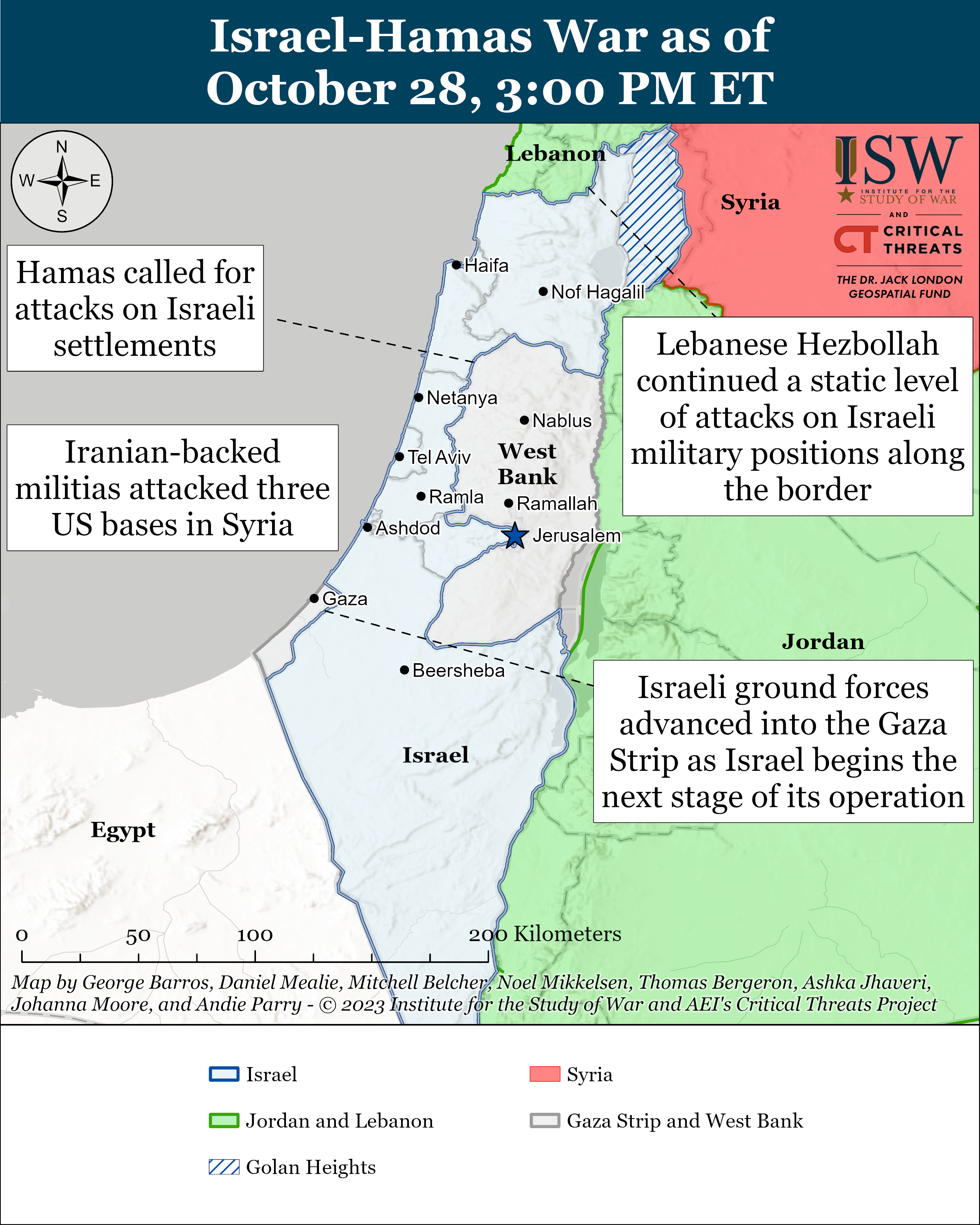
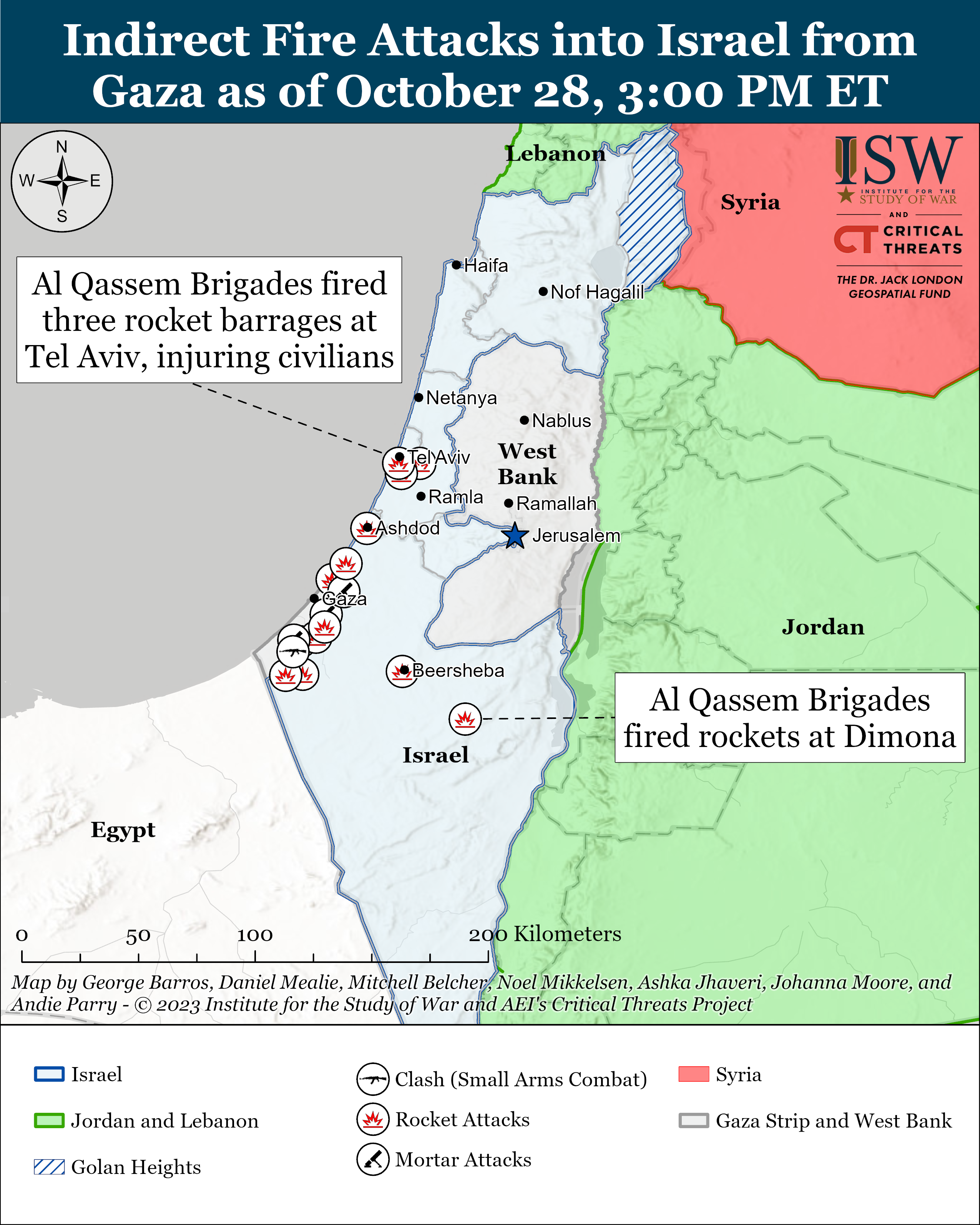
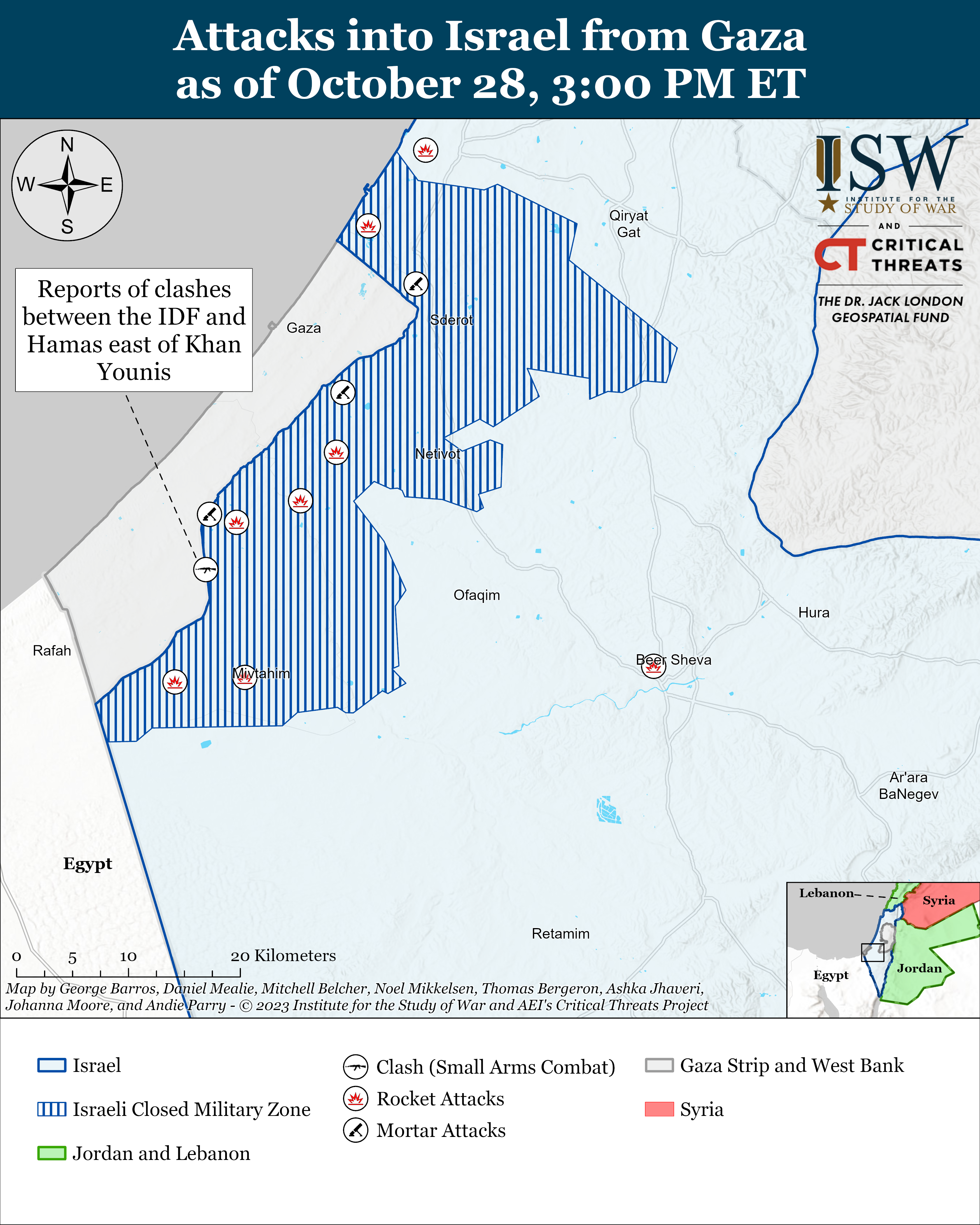
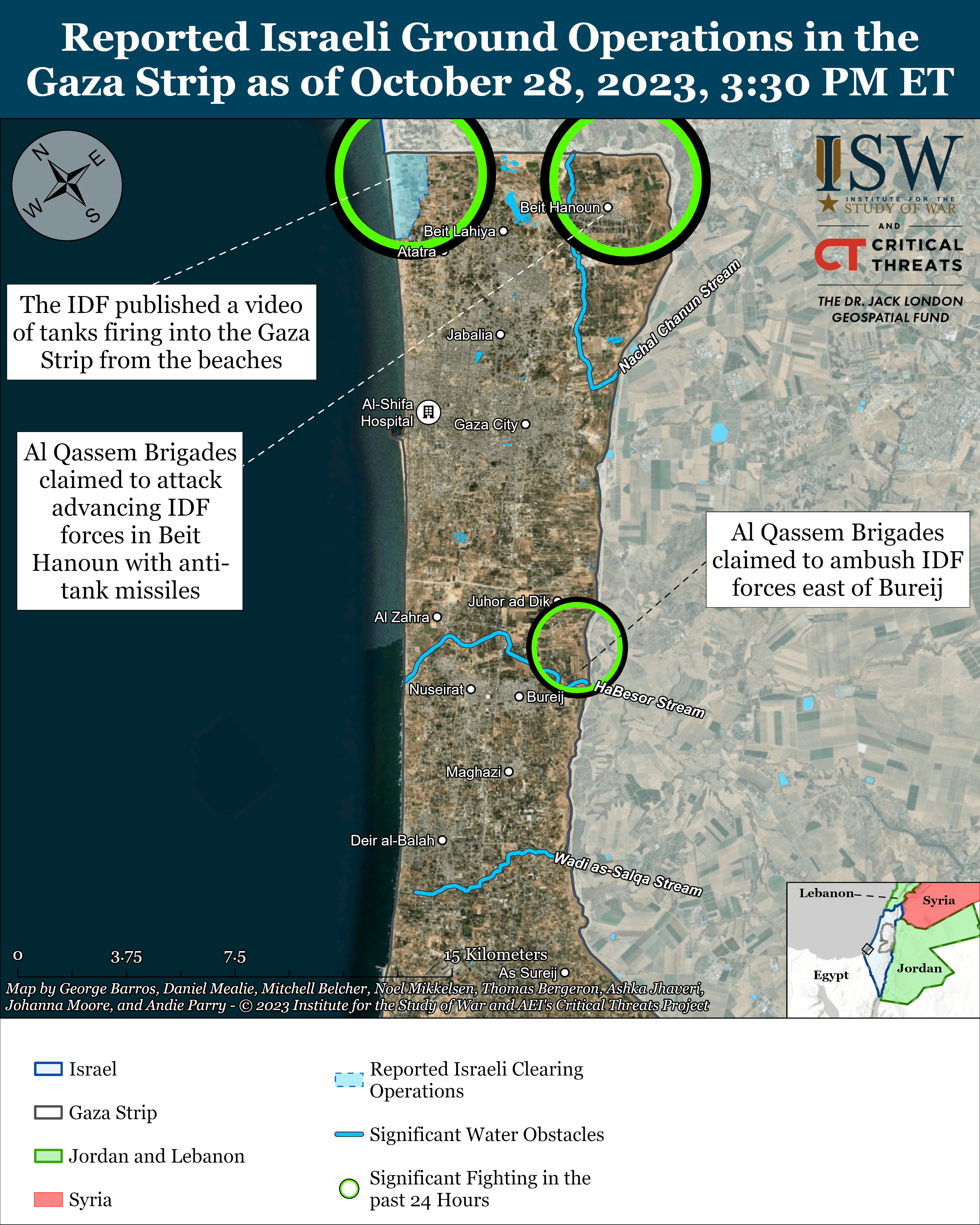
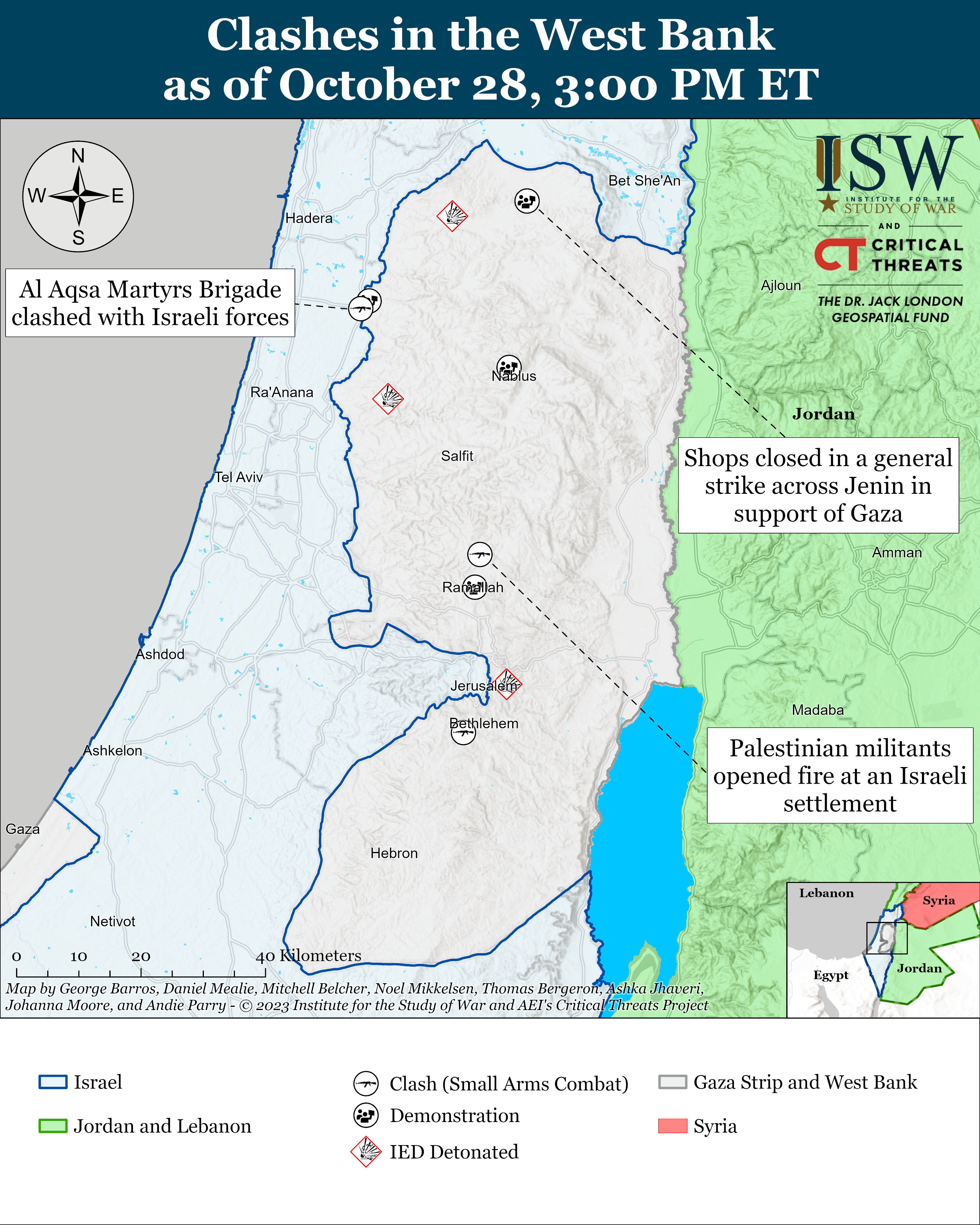
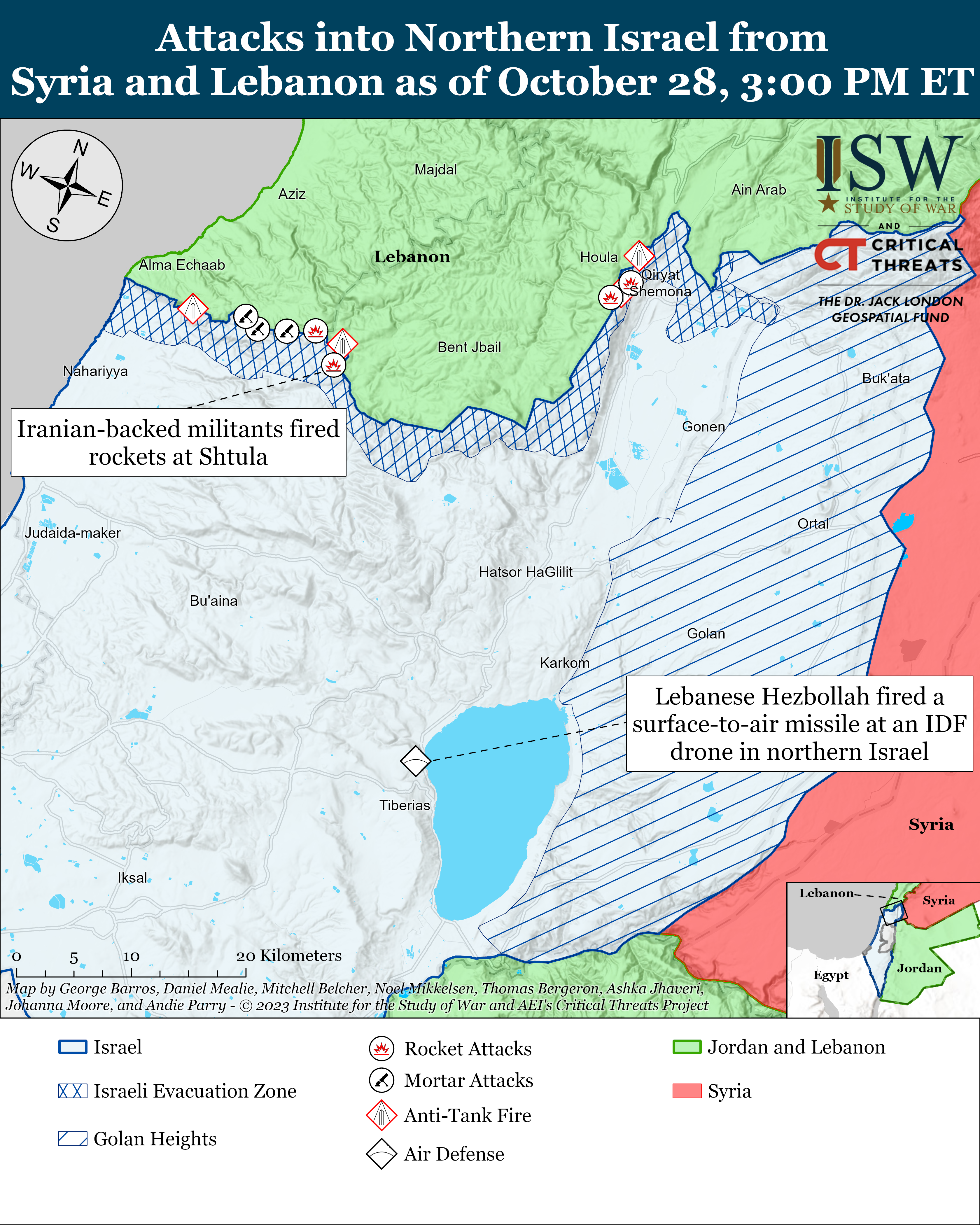
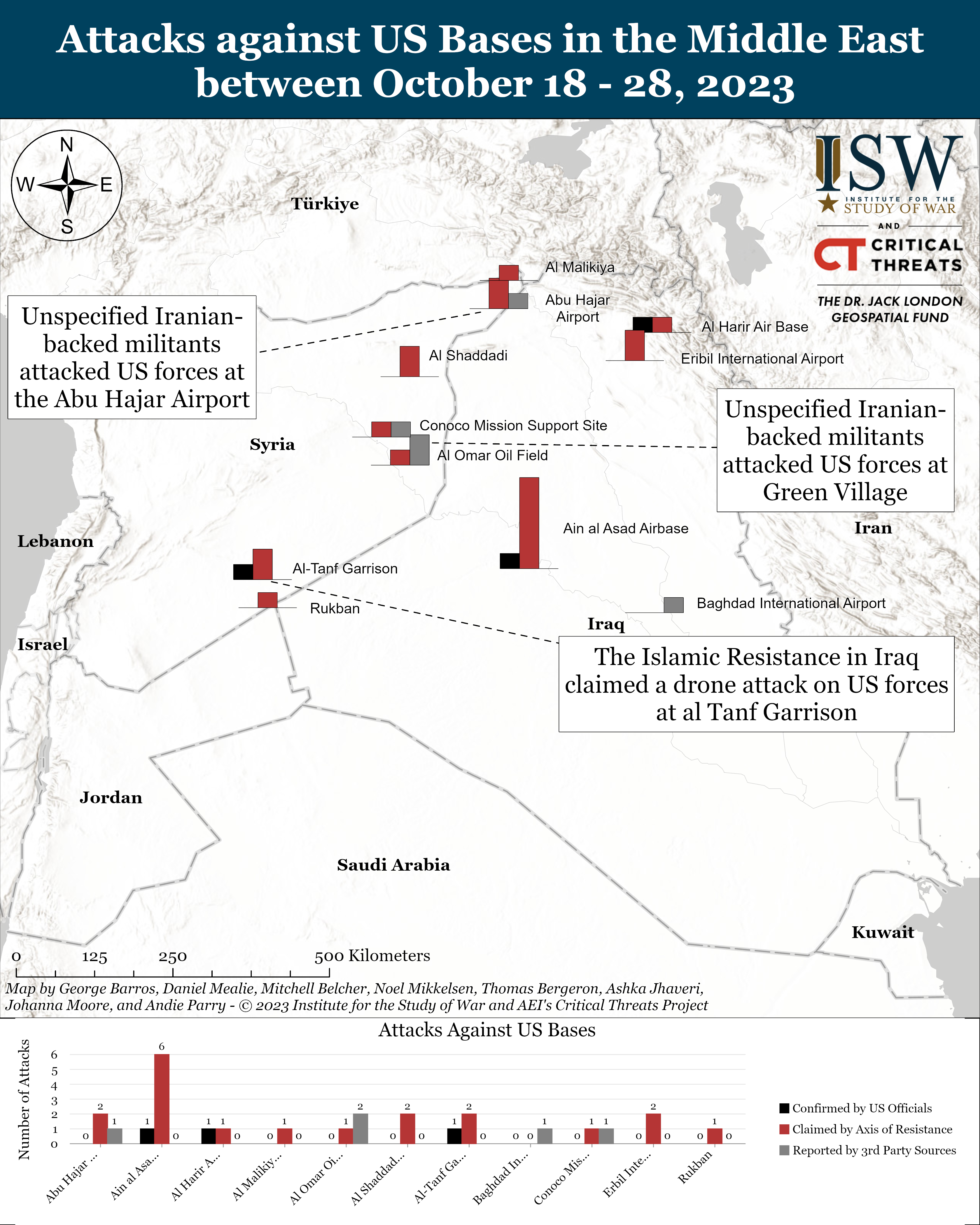
No comments:
Post a Comment